A Personal Ethical Dilemma: Decision-Making in a Business Context
VerifiedAdded on 2023/04/24
|17
|4472
|257
Essay
AI Summary
This essay delves into a personal ethical dilemma encountered in a business setting, where the author had to navigate the complexities of choosing between personal relationships and professional obligations while sorting applications for a job opening. The dilemma involved a close friend whose qualifications did not meet the job requirements, leading to a conflict between favoritism and fairness to other candidates. The analysis incorporates ethical theories such as utilitarianism, deontology, and the Salience Model to evaluate the situation and justify the final decision. The author reflects on the importance of ethical conduct, stakeholder needs, and the potential consequences of biased decision-making, ultimately emphasizing the significance of objectivity and integrity in professional roles. The essay also explores different perspectives and potential solutions, highlighting the need for transparency, unbiased evaluation, and adherence to organizational ethics to resolve such dilemmas effectively.
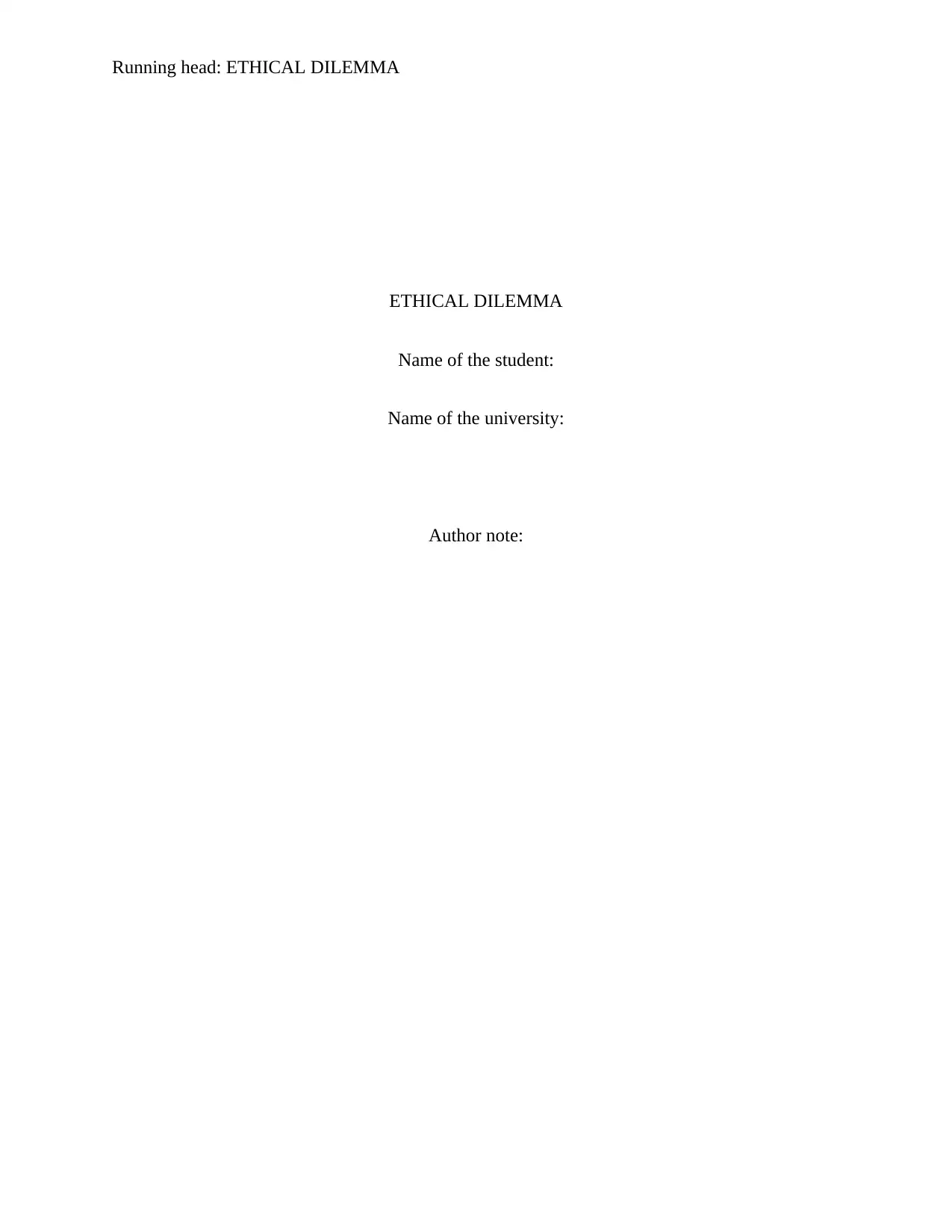
Running head: ETHICAL DILEMMA
ETHICAL DILEMMA
Name of the student:
Name of the university:
Author note:
ETHICAL DILEMMA
Name of the student:
Name of the university:
Author note:
Paraphrase This Document
Need a fresh take? Get an instant paraphrase of this document with our AI Paraphraser
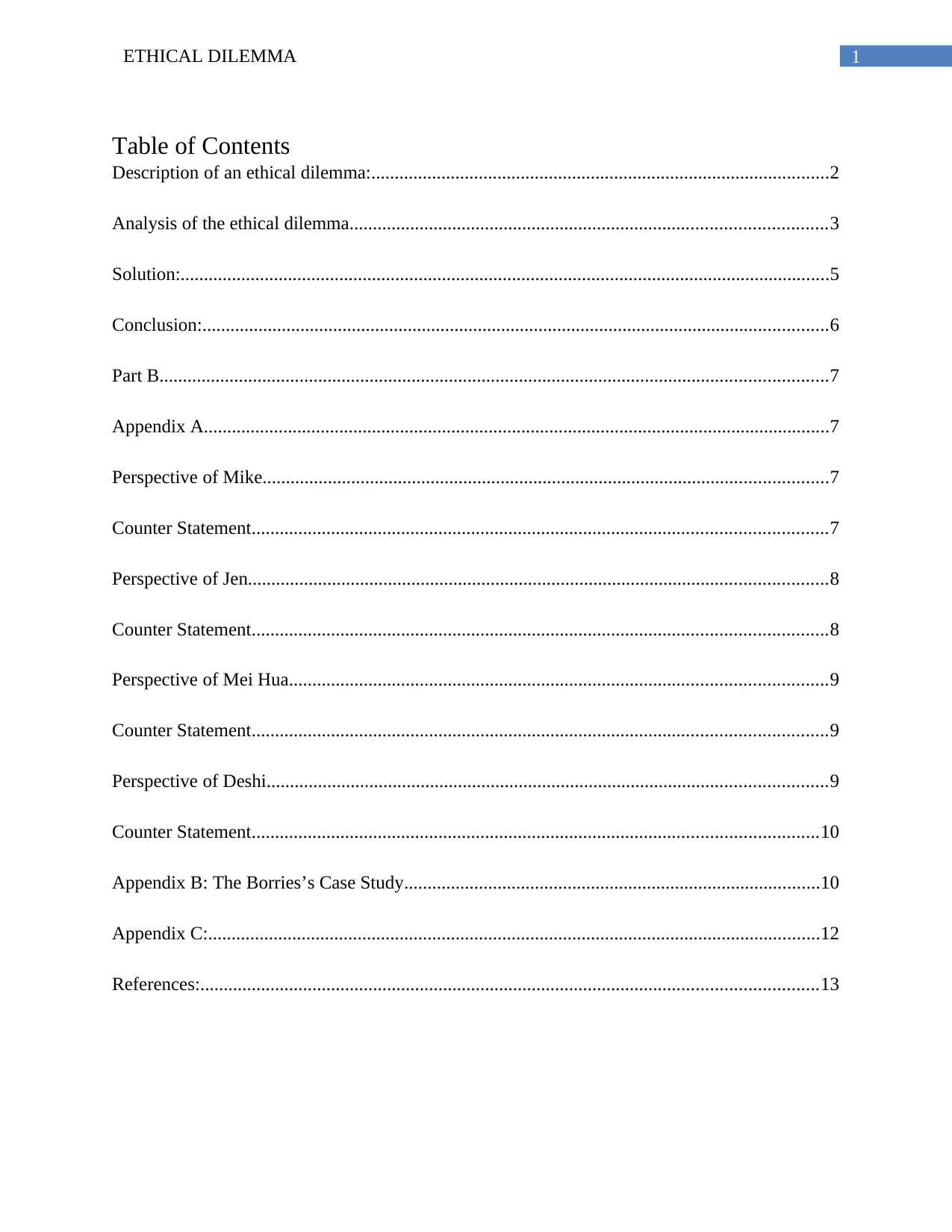
1ETHICAL DILEMMA
Table of Contents
Description of an ethical dilemma:..................................................................................................2
Analysis of the ethical dilemma......................................................................................................3
Solution:...........................................................................................................................................5
Conclusion:......................................................................................................................................6
Part B...............................................................................................................................................7
Appendix A......................................................................................................................................7
Perspective of Mike.........................................................................................................................7
Counter Statement...........................................................................................................................7
Perspective of Jen............................................................................................................................8
Counter Statement...........................................................................................................................8
Perspective of Mei Hua...................................................................................................................9
Counter Statement...........................................................................................................................9
Perspective of Deshi........................................................................................................................9
Counter Statement.........................................................................................................................10
Appendix B: The Borries’s Case Study.........................................................................................10
Appendix C:...................................................................................................................................12
References:....................................................................................................................................13
Table of Contents
Description of an ethical dilemma:..................................................................................................2
Analysis of the ethical dilemma......................................................................................................3
Solution:...........................................................................................................................................5
Conclusion:......................................................................................................................................6
Part B...............................................................................................................................................7
Appendix A......................................................................................................................................7
Perspective of Mike.........................................................................................................................7
Counter Statement...........................................................................................................................7
Perspective of Jen............................................................................................................................8
Counter Statement...........................................................................................................................8
Perspective of Mei Hua...................................................................................................................9
Counter Statement...........................................................................................................................9
Perspective of Deshi........................................................................................................................9
Counter Statement.........................................................................................................................10
Appendix B: The Borries’s Case Study.........................................................................................10
Appendix C:...................................................................................................................................12
References:....................................................................................................................................13
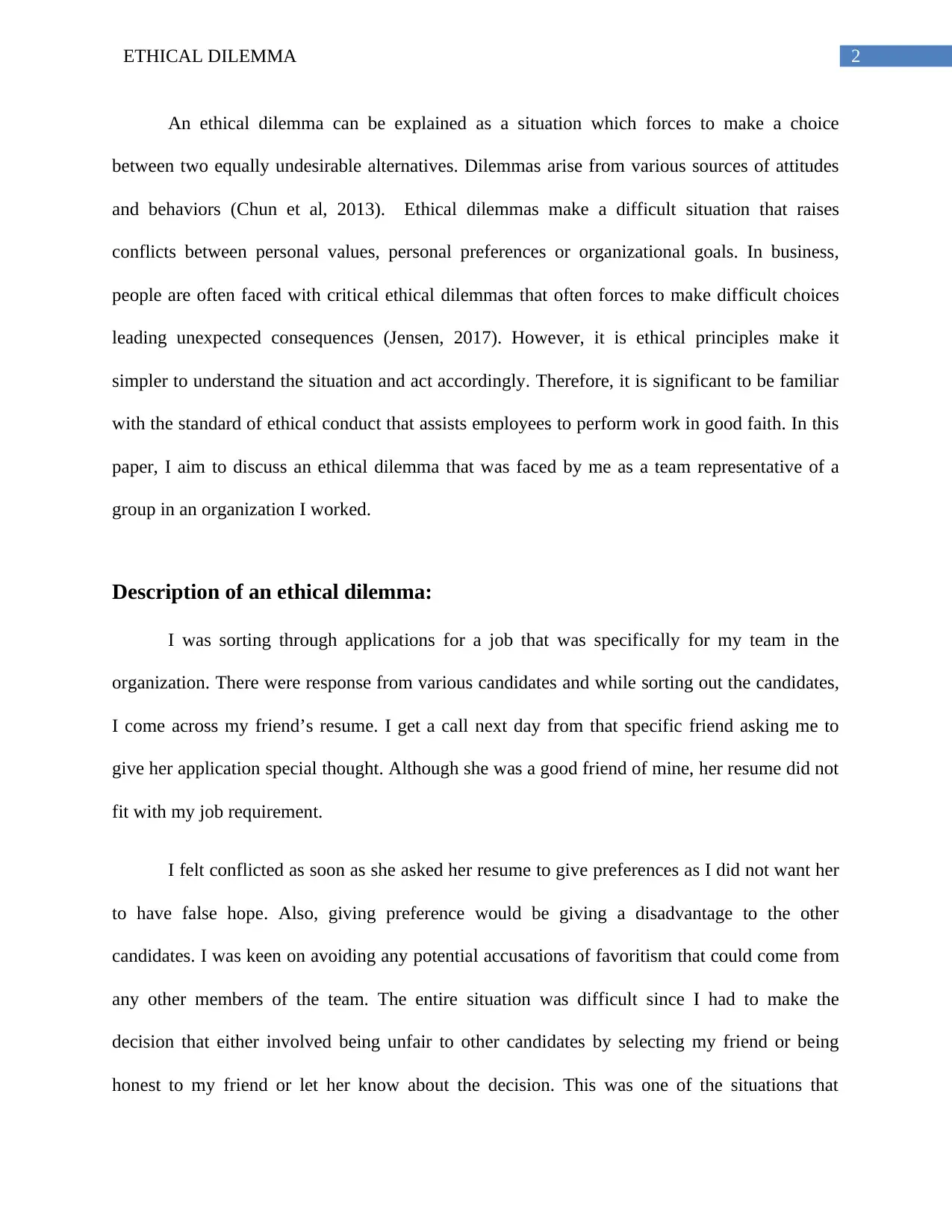
2ETHICAL DILEMMA
An ethical dilemma can be explained as a situation which forces to make a choice
between two equally undesirable alternatives. Dilemmas arise from various sources of attitudes
and behaviors (Chun et al, 2013). Ethical dilemmas make a difficult situation that raises
conflicts between personal values, personal preferences or organizational goals. In business,
people are often faced with critical ethical dilemmas that often forces to make difficult choices
leading unexpected consequences (Jensen, 2017). However, it is ethical principles make it
simpler to understand the situation and act accordingly. Therefore, it is significant to be familiar
with the standard of ethical conduct that assists employees to perform work in good faith. In this
paper, I aim to discuss an ethical dilemma that was faced by me as a team representative of a
group in an organization I worked.
Description of an ethical dilemma:
I was sorting through applications for a job that was specifically for my team in the
organization. There were response from various candidates and while sorting out the candidates,
I come across my friend’s resume. I get a call next day from that specific friend asking me to
give her application special thought. Although she was a good friend of mine, her resume did not
fit with my job requirement.
I felt conflicted as soon as she asked her resume to give preferences as I did not want her
to have false hope. Also, giving preference would be giving a disadvantage to the other
candidates. I was keen on avoiding any potential accusations of favoritism that could come from
any other members of the team. The entire situation was difficult since I had to make the
decision that either involved being unfair to other candidates by selecting my friend or being
honest to my friend or let her know about the decision. This was one of the situations that
An ethical dilemma can be explained as a situation which forces to make a choice
between two equally undesirable alternatives. Dilemmas arise from various sources of attitudes
and behaviors (Chun et al, 2013). Ethical dilemmas make a difficult situation that raises
conflicts between personal values, personal preferences or organizational goals. In business,
people are often faced with critical ethical dilemmas that often forces to make difficult choices
leading unexpected consequences (Jensen, 2017). However, it is ethical principles make it
simpler to understand the situation and act accordingly. Therefore, it is significant to be familiar
with the standard of ethical conduct that assists employees to perform work in good faith. In this
paper, I aim to discuss an ethical dilemma that was faced by me as a team representative of a
group in an organization I worked.
Description of an ethical dilemma:
I was sorting through applications for a job that was specifically for my team in the
organization. There were response from various candidates and while sorting out the candidates,
I come across my friend’s resume. I get a call next day from that specific friend asking me to
give her application special thought. Although she was a good friend of mine, her resume did not
fit with my job requirement.
I felt conflicted as soon as she asked her resume to give preferences as I did not want her
to have false hope. Also, giving preference would be giving a disadvantage to the other
candidates. I was keen on avoiding any potential accusations of favoritism that could come from
any other members of the team. The entire situation was difficult since I had to make the
decision that either involved being unfair to other candidates by selecting my friend or being
honest to my friend or let her know about the decision. This was one of the situations that
⊘ This is a preview!⊘
Do you want full access?
Subscribe today to unlock all pages.

Trusted by 1+ million students worldwide
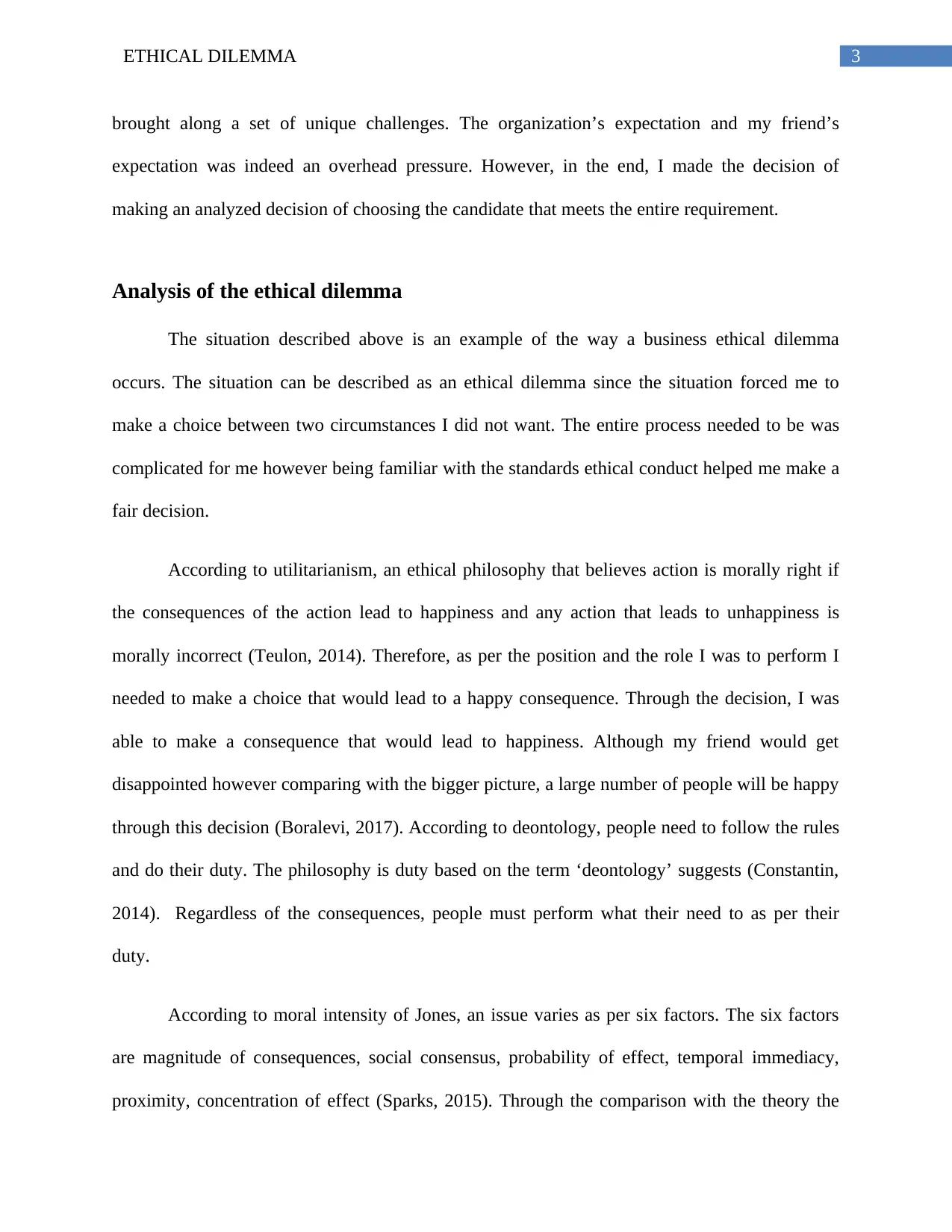
3ETHICAL DILEMMA
brought along a set of unique challenges. The organization’s expectation and my friend’s
expectation was indeed an overhead pressure. However, in the end, I made the decision of
making an analyzed decision of choosing the candidate that meets the entire requirement.
Analysis of the ethical dilemma
The situation described above is an example of the way a business ethical dilemma
occurs. The situation can be described as an ethical dilemma since the situation forced me to
make a choice between two circumstances I did not want. The entire process needed to be was
complicated for me however being familiar with the standards ethical conduct helped me make a
fair decision.
According to utilitarianism, an ethical philosophy that believes action is morally right if
the consequences of the action lead to happiness and any action that leads to unhappiness is
morally incorrect (Teulon, 2014). Therefore, as per the position and the role I was to perform I
needed to make a choice that would lead to a happy consequence. Through the decision, I was
able to make a consequence that would lead to happiness. Although my friend would get
disappointed however comparing with the bigger picture, a large number of people will be happy
through this decision (Boralevi, 2017). According to deontology, people need to follow the rules
and do their duty. The philosophy is duty based on the term ‘deontology’ suggests (Constantin,
2014). Regardless of the consequences, people must perform what their need to as per their
duty.
According to moral intensity of Jones, an issue varies as per six factors. The six factors
are magnitude of consequences, social consensus, probability of effect, temporal immediacy,
proximity, concentration of effect (Sparks, 2015). Through the comparison with the theory the
brought along a set of unique challenges. The organization’s expectation and my friend’s
expectation was indeed an overhead pressure. However, in the end, I made the decision of
making an analyzed decision of choosing the candidate that meets the entire requirement.
Analysis of the ethical dilemma
The situation described above is an example of the way a business ethical dilemma
occurs. The situation can be described as an ethical dilemma since the situation forced me to
make a choice between two circumstances I did not want. The entire process needed to be was
complicated for me however being familiar with the standards ethical conduct helped me make a
fair decision.
According to utilitarianism, an ethical philosophy that believes action is morally right if
the consequences of the action lead to happiness and any action that leads to unhappiness is
morally incorrect (Teulon, 2014). Therefore, as per the position and the role I was to perform I
needed to make a choice that would lead to a happy consequence. Through the decision, I was
able to make a consequence that would lead to happiness. Although my friend would get
disappointed however comparing with the bigger picture, a large number of people will be happy
through this decision (Boralevi, 2017). According to deontology, people need to follow the rules
and do their duty. The philosophy is duty based on the term ‘deontology’ suggests (Constantin,
2014). Regardless of the consequences, people must perform what their need to as per their
duty.
According to moral intensity of Jones, an issue varies as per six factors. The six factors
are magnitude of consequences, social consensus, probability of effect, temporal immediacy,
proximity, concentration of effect (Sparks, 2015). Through the comparison with the theory the
Paraphrase This Document
Need a fresh take? Get an instant paraphrase of this document with our AI Paraphraser
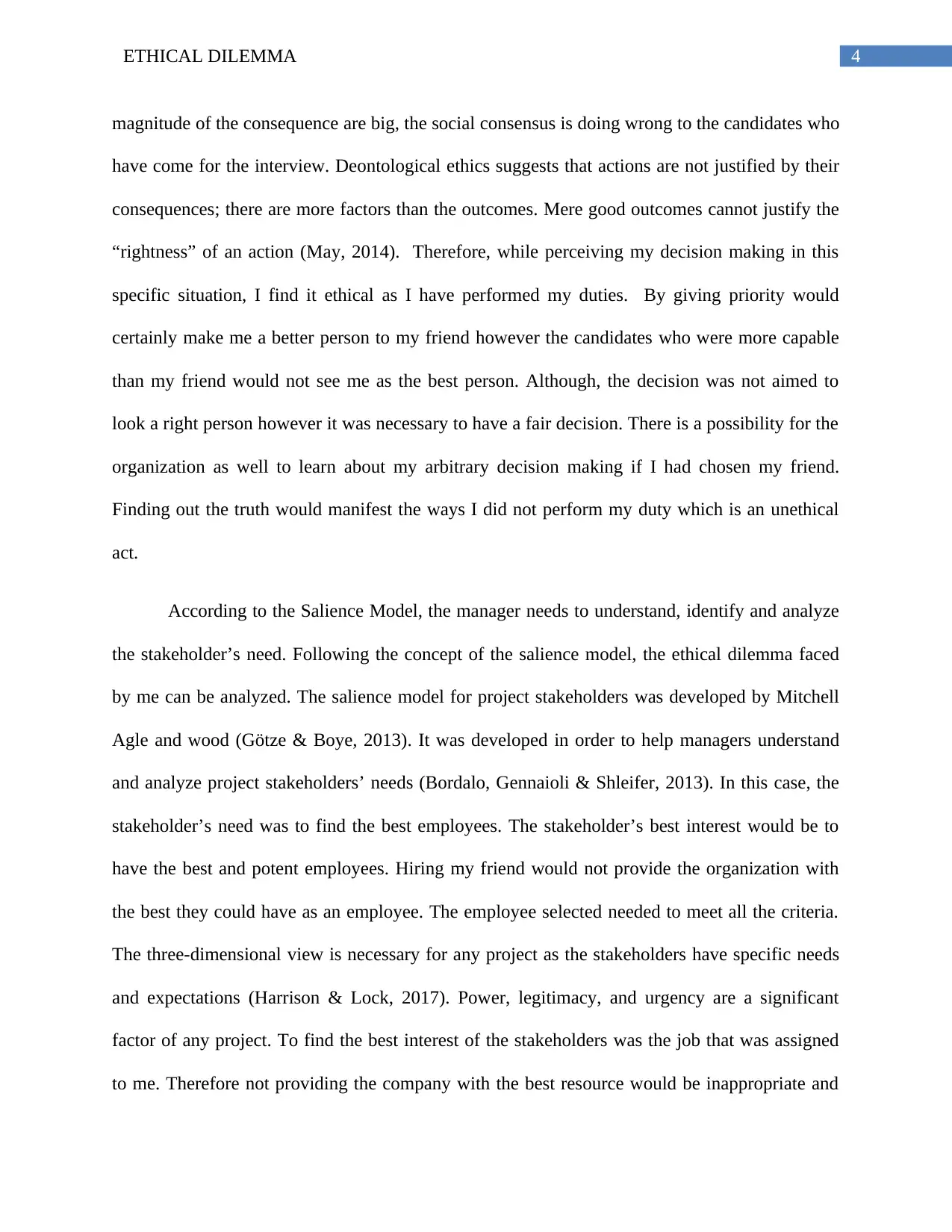
4ETHICAL DILEMMA
magnitude of the consequence are big, the social consensus is doing wrong to the candidates who
have come for the interview. Deontological ethics suggests that actions are not justified by their
consequences; there are more factors than the outcomes. Mere good outcomes cannot justify the
“rightness” of an action (May, 2014). Therefore, while perceiving my decision making in this
specific situation, I find it ethical as I have performed my duties. By giving priority would
certainly make me a better person to my friend however the candidates who were more capable
than my friend would not see me as the best person. Although, the decision was not aimed to
look a right person however it was necessary to have a fair decision. There is a possibility for the
organization as well to learn about my arbitrary decision making if I had chosen my friend.
Finding out the truth would manifest the ways I did not perform my duty which is an unethical
act.
According to the Salience Model, the manager needs to understand, identify and analyze
the stakeholder’s need. Following the concept of the salience model, the ethical dilemma faced
by me can be analyzed. The salience model for project stakeholders was developed by Mitchell
Agle and wood (Götze & Boye, 2013). It was developed in order to help managers understand
and analyze project stakeholders’ needs (Bordalo, Gennaioli & Shleifer, 2013). In this case, the
stakeholder’s need was to find the best employees. The stakeholder’s best interest would be to
have the best and potent employees. Hiring my friend would not provide the organization with
the best they could have as an employee. The employee selected needed to meet all the criteria.
The three-dimensional view is necessary for any project as the stakeholders have specific needs
and expectations (Harrison & Lock, 2017). Power, legitimacy, and urgency are a significant
factor of any project. To find the best interest of the stakeholders was the job that was assigned
to me. Therefore not providing the company with the best resource would be inappropriate and
magnitude of the consequence are big, the social consensus is doing wrong to the candidates who
have come for the interview. Deontological ethics suggests that actions are not justified by their
consequences; there are more factors than the outcomes. Mere good outcomes cannot justify the
“rightness” of an action (May, 2014). Therefore, while perceiving my decision making in this
specific situation, I find it ethical as I have performed my duties. By giving priority would
certainly make me a better person to my friend however the candidates who were more capable
than my friend would not see me as the best person. Although, the decision was not aimed to
look a right person however it was necessary to have a fair decision. There is a possibility for the
organization as well to learn about my arbitrary decision making if I had chosen my friend.
Finding out the truth would manifest the ways I did not perform my duty which is an unethical
act.
According to the Salience Model, the manager needs to understand, identify and analyze
the stakeholder’s need. Following the concept of the salience model, the ethical dilemma faced
by me can be analyzed. The salience model for project stakeholders was developed by Mitchell
Agle and wood (Götze & Boye, 2013). It was developed in order to help managers understand
and analyze project stakeholders’ needs (Bordalo, Gennaioli & Shleifer, 2013). In this case, the
stakeholder’s need was to find the best employees. The stakeholder’s best interest would be to
have the best and potent employees. Hiring my friend would not provide the organization with
the best they could have as an employee. The employee selected needed to meet all the criteria.
The three-dimensional view is necessary for any project as the stakeholders have specific needs
and expectations (Harrison & Lock, 2017). Power, legitimacy, and urgency are a significant
factor of any project. To find the best interest of the stakeholders was the job that was assigned
to me. Therefore not providing the company with the best resource would be inappropriate and
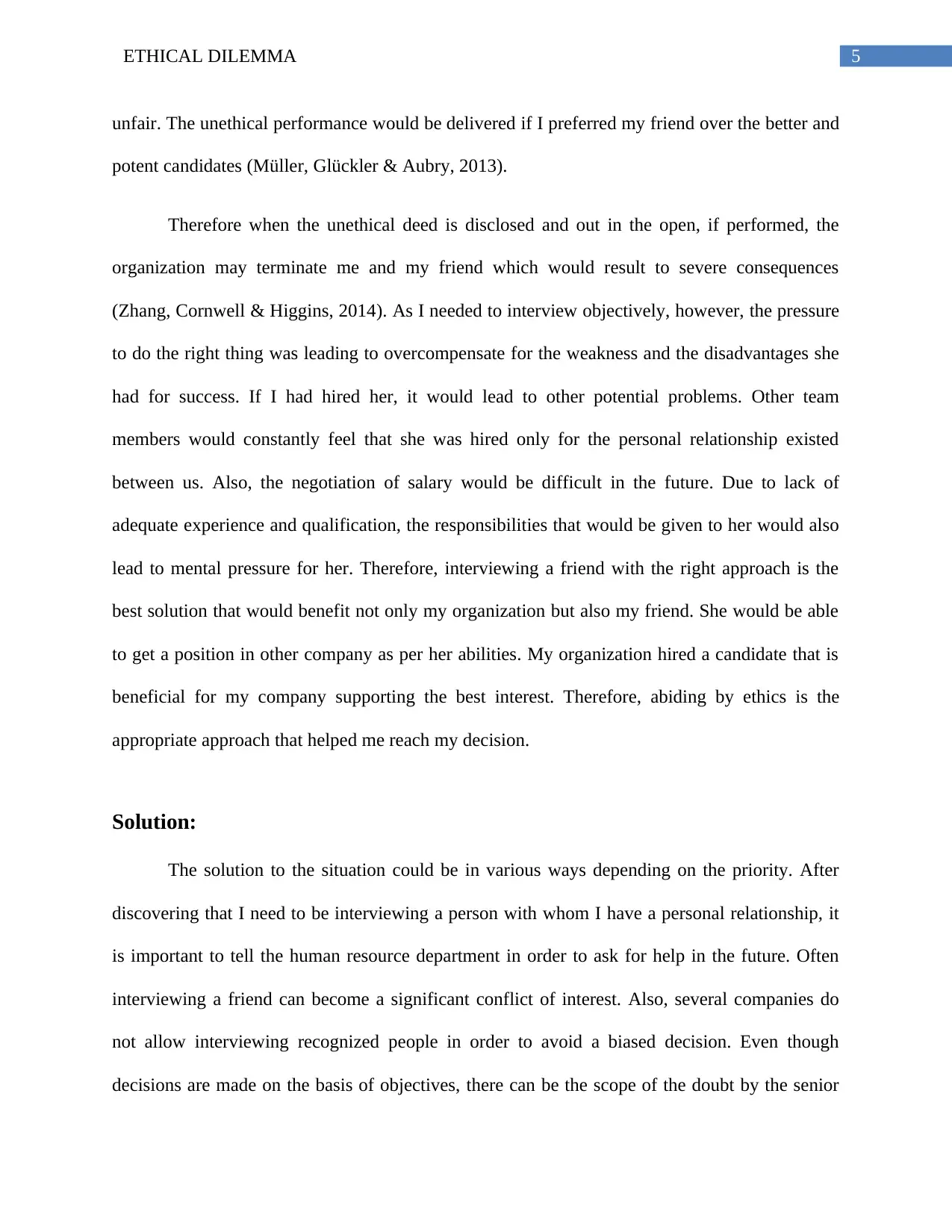
5ETHICAL DILEMMA
unfair. The unethical performance would be delivered if I preferred my friend over the better and
potent candidates (Müller, Glückler & Aubry, 2013).
Therefore when the unethical deed is disclosed and out in the open, if performed, the
organization may terminate me and my friend which would result to severe consequences
(Zhang, Cornwell & Higgins, 2014). As I needed to interview objectively, however, the pressure
to do the right thing was leading to overcompensate for the weakness and the disadvantages she
had for success. If I had hired her, it would lead to other potential problems. Other team
members would constantly feel that she was hired only for the personal relationship existed
between us. Also, the negotiation of salary would be difficult in the future. Due to lack of
adequate experience and qualification, the responsibilities that would be given to her would also
lead to mental pressure for her. Therefore, interviewing a friend with the right approach is the
best solution that would benefit not only my organization but also my friend. She would be able
to get a position in other company as per her abilities. My organization hired a candidate that is
beneficial for my company supporting the best interest. Therefore, abiding by ethics is the
appropriate approach that helped me reach my decision.
Solution:
The solution to the situation could be in various ways depending on the priority. After
discovering that I need to be interviewing a person with whom I have a personal relationship, it
is important to tell the human resource department in order to ask for help in the future. Often
interviewing a friend can become a significant conflict of interest. Also, several companies do
not allow interviewing recognized people in order to avoid a biased decision. Even though
decisions are made on the basis of objectives, there can be the scope of the doubt by the senior
unfair. The unethical performance would be delivered if I preferred my friend over the better and
potent candidates (Müller, Glückler & Aubry, 2013).
Therefore when the unethical deed is disclosed and out in the open, if performed, the
organization may terminate me and my friend which would result to severe consequences
(Zhang, Cornwell & Higgins, 2014). As I needed to interview objectively, however, the pressure
to do the right thing was leading to overcompensate for the weakness and the disadvantages she
had for success. If I had hired her, it would lead to other potential problems. Other team
members would constantly feel that she was hired only for the personal relationship existed
between us. Also, the negotiation of salary would be difficult in the future. Due to lack of
adequate experience and qualification, the responsibilities that would be given to her would also
lead to mental pressure for her. Therefore, interviewing a friend with the right approach is the
best solution that would benefit not only my organization but also my friend. She would be able
to get a position in other company as per her abilities. My organization hired a candidate that is
beneficial for my company supporting the best interest. Therefore, abiding by ethics is the
appropriate approach that helped me reach my decision.
Solution:
The solution to the situation could be in various ways depending on the priority. After
discovering that I need to be interviewing a person with whom I have a personal relationship, it
is important to tell the human resource department in order to ask for help in the future. Often
interviewing a friend can become a significant conflict of interest. Also, several companies do
not allow interviewing recognized people in order to avoid a biased decision. Even though
decisions are made on the basis of objectives, there can be the scope of the doubt by the senior
⊘ This is a preview!⊘
Do you want full access?
Subscribe today to unlock all pages.

Trusted by 1+ million students worldwide
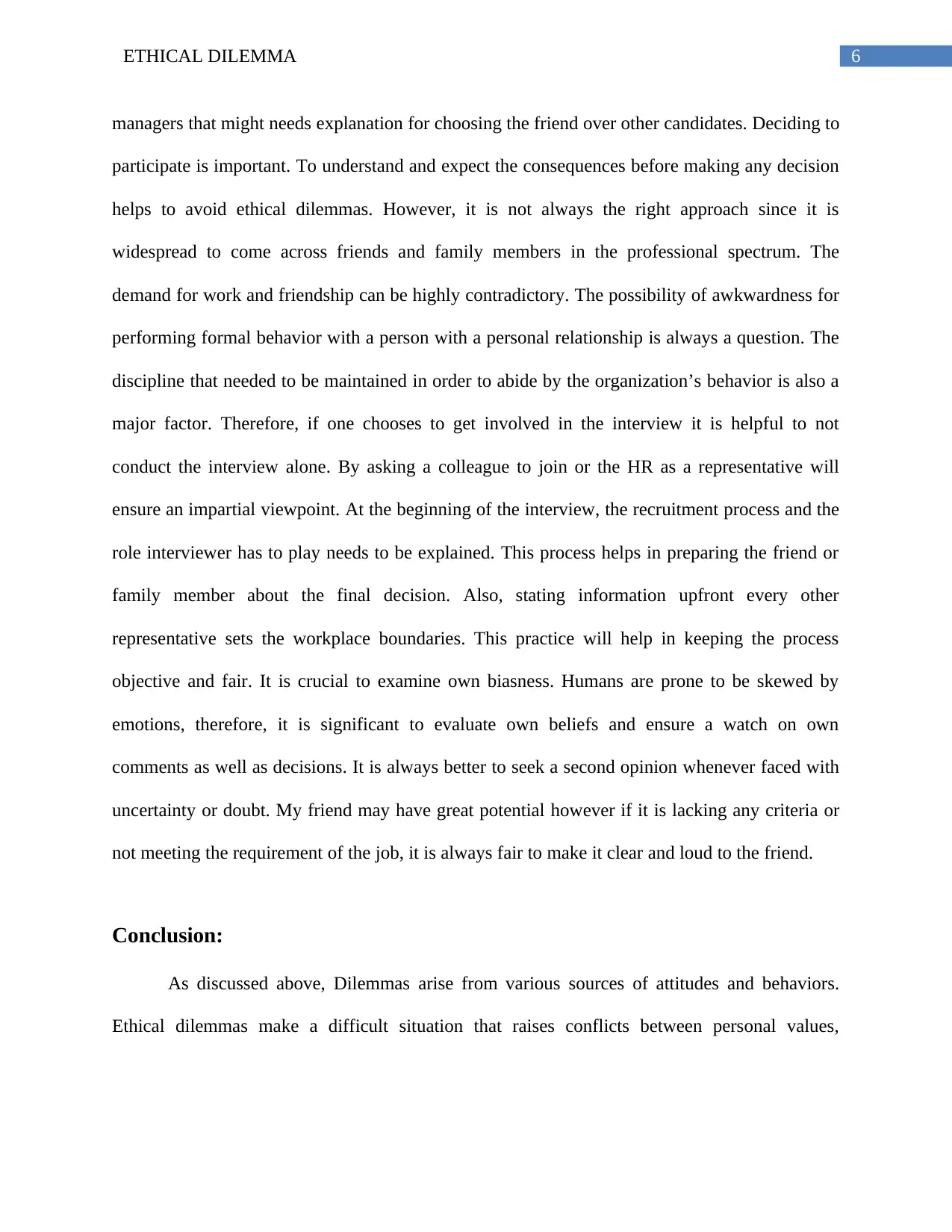
6ETHICAL DILEMMA
managers that might needs explanation for choosing the friend over other candidates. Deciding to
participate is important. To understand and expect the consequences before making any decision
helps to avoid ethical dilemmas. However, it is not always the right approach since it is
widespread to come across friends and family members in the professional spectrum. The
demand for work and friendship can be highly contradictory. The possibility of awkwardness for
performing formal behavior with a person with a personal relationship is always a question. The
discipline that needed to be maintained in order to abide by the organization’s behavior is also a
major factor. Therefore, if one chooses to get involved in the interview it is helpful to not
conduct the interview alone. By asking a colleague to join or the HR as a representative will
ensure an impartial viewpoint. At the beginning of the interview, the recruitment process and the
role interviewer has to play needs to be explained. This process helps in preparing the friend or
family member about the final decision. Also, stating information upfront every other
representative sets the workplace boundaries. This practice will help in keeping the process
objective and fair. It is crucial to examine own biasness. Humans are prone to be skewed by
emotions, therefore, it is significant to evaluate own beliefs and ensure a watch on own
comments as well as decisions. It is always better to seek a second opinion whenever faced with
uncertainty or doubt. My friend may have great potential however if it is lacking any criteria or
not meeting the requirement of the job, it is always fair to make it clear and loud to the friend.
Conclusion:
As discussed above, Dilemmas arise from various sources of attitudes and behaviors.
Ethical dilemmas make a difficult situation that raises conflicts between personal values,
managers that might needs explanation for choosing the friend over other candidates. Deciding to
participate is important. To understand and expect the consequences before making any decision
helps to avoid ethical dilemmas. However, it is not always the right approach since it is
widespread to come across friends and family members in the professional spectrum. The
demand for work and friendship can be highly contradictory. The possibility of awkwardness for
performing formal behavior with a person with a personal relationship is always a question. The
discipline that needed to be maintained in order to abide by the organization’s behavior is also a
major factor. Therefore, if one chooses to get involved in the interview it is helpful to not
conduct the interview alone. By asking a colleague to join or the HR as a representative will
ensure an impartial viewpoint. At the beginning of the interview, the recruitment process and the
role interviewer has to play needs to be explained. This process helps in preparing the friend or
family member about the final decision. Also, stating information upfront every other
representative sets the workplace boundaries. This practice will help in keeping the process
objective and fair. It is crucial to examine own biasness. Humans are prone to be skewed by
emotions, therefore, it is significant to evaluate own beliefs and ensure a watch on own
comments as well as decisions. It is always better to seek a second opinion whenever faced with
uncertainty or doubt. My friend may have great potential however if it is lacking any criteria or
not meeting the requirement of the job, it is always fair to make it clear and loud to the friend.
Conclusion:
As discussed above, Dilemmas arise from various sources of attitudes and behaviors.
Ethical dilemmas make a difficult situation that raises conflicts between personal values,
Paraphrase This Document
Need a fresh take? Get an instant paraphrase of this document with our AI Paraphraser
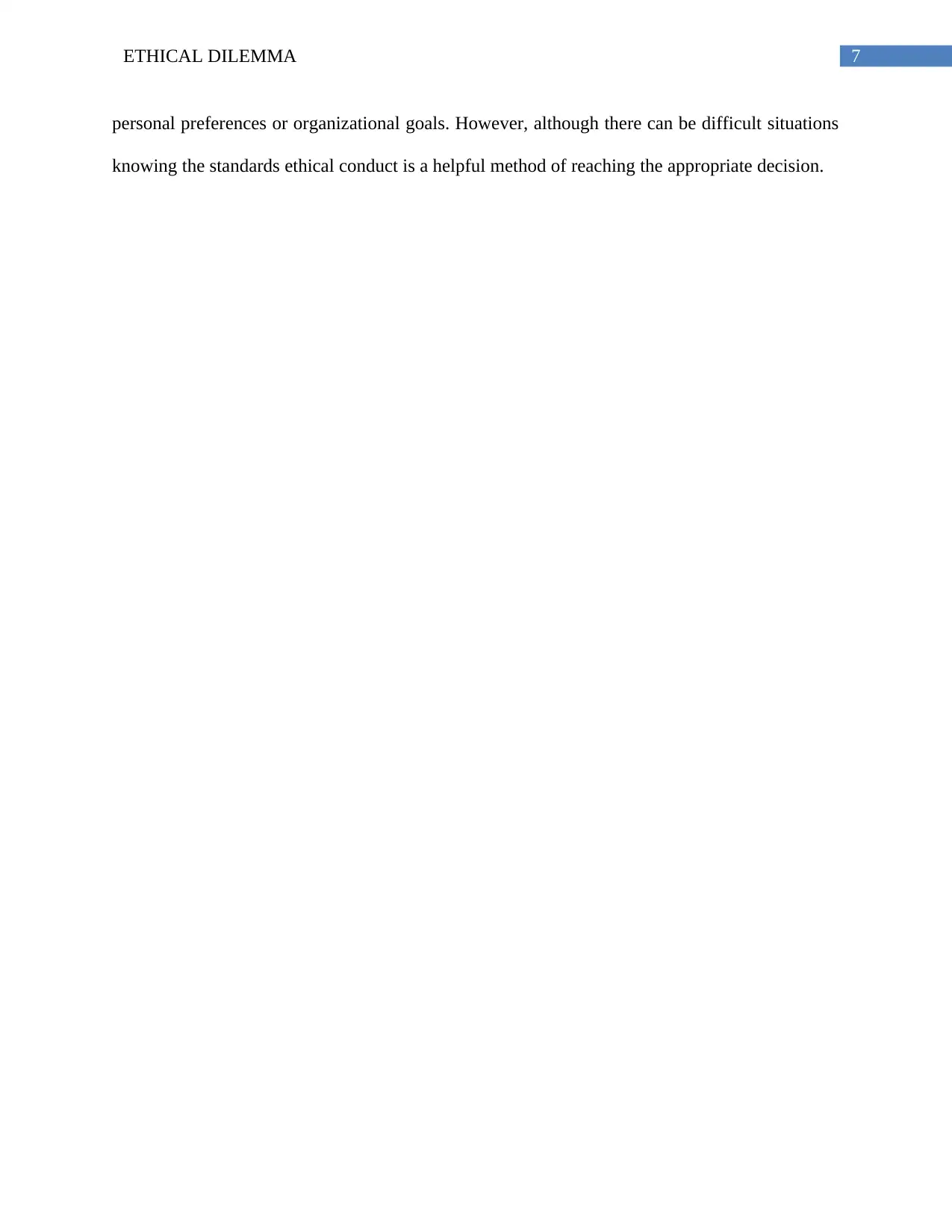
7ETHICAL DILEMMA
personal preferences or organizational goals. However, although there can be difficult situations
knowing the standards ethical conduct is a helpful method of reaching the appropriate decision.
personal preferences or organizational goals. However, although there can be difficult situations
knowing the standards ethical conduct is a helpful method of reaching the appropriate decision.
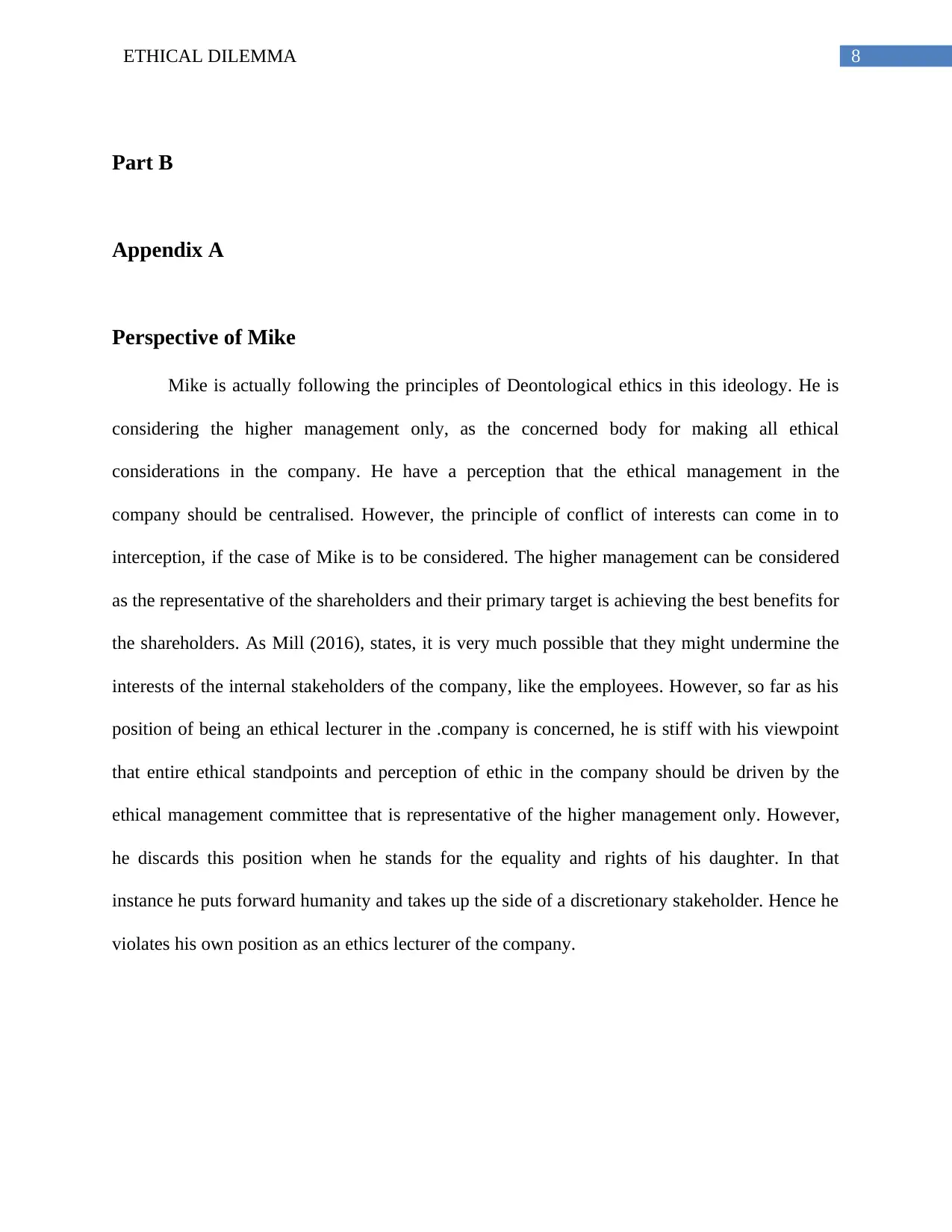
8ETHICAL DILEMMA
Part B
Appendix A
Perspective of Mike
Mike is actually following the principles of Deontological ethics in this ideology. He is
considering the higher management only, as the concerned body for making all ethical
considerations in the company. He have a perception that the ethical management in the
company should be centralised. However, the principle of conflict of interests can come in to
interception, if the case of Mike is to be considered. The higher management can be considered
as the representative of the shareholders and their primary target is achieving the best benefits for
the shareholders. As Mill (2016), states, it is very much possible that they might undermine the
interests of the internal stakeholders of the company, like the employees. However, so far as his
position of being an ethical lecturer in the .company is concerned, he is stiff with his viewpoint
that entire ethical standpoints and perception of ethic in the company should be driven by the
ethical management committee that is representative of the higher management only. However,
he discards this position when he stands for the equality and rights of his daughter. In that
instance he puts forward humanity and takes up the side of a discretionary stakeholder. Hence he
violates his own position as an ethics lecturer of the company.
Part B
Appendix A
Perspective of Mike
Mike is actually following the principles of Deontological ethics in this ideology. He is
considering the higher management only, as the concerned body for making all ethical
considerations in the company. He have a perception that the ethical management in the
company should be centralised. However, the principle of conflict of interests can come in to
interception, if the case of Mike is to be considered. The higher management can be considered
as the representative of the shareholders and their primary target is achieving the best benefits for
the shareholders. As Mill (2016), states, it is very much possible that they might undermine the
interests of the internal stakeholders of the company, like the employees. However, so far as his
position of being an ethical lecturer in the .company is concerned, he is stiff with his viewpoint
that entire ethical standpoints and perception of ethic in the company should be driven by the
ethical management committee that is representative of the higher management only. However,
he discards this position when he stands for the equality and rights of his daughter. In that
instance he puts forward humanity and takes up the side of a discretionary stakeholder. Hence he
violates his own position as an ethics lecturer of the company.
⊘ This is a preview!⊘
Do you want full access?
Subscribe today to unlock all pages.

Trusted by 1+ million students worldwide
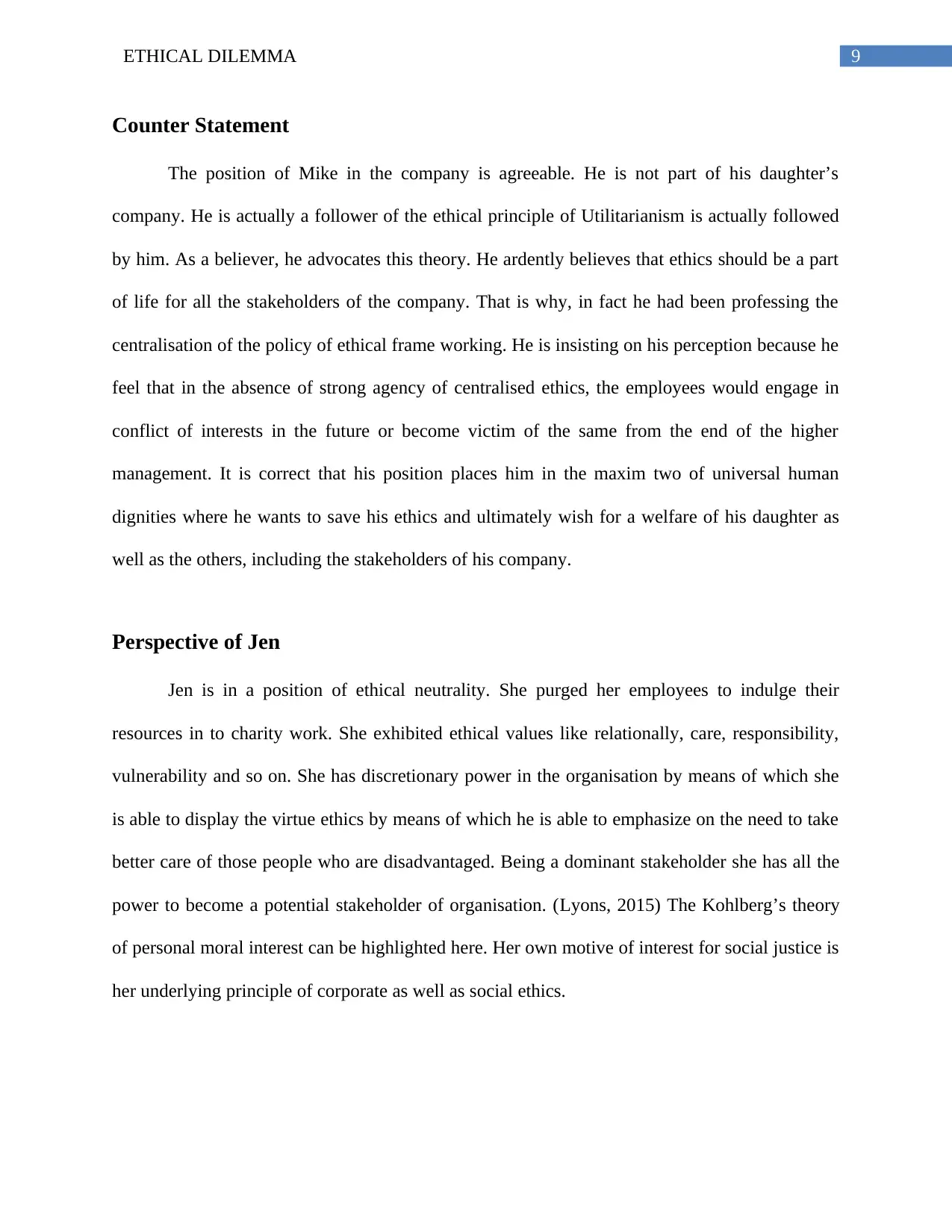
9ETHICAL DILEMMA
Counter Statement
The position of Mike in the company is agreeable. He is not part of his daughter’s
company. He is actually a follower of the ethical principle of Utilitarianism is actually followed
by him. As a believer, he advocates this theory. He ardently believes that ethics should be a part
of life for all the stakeholders of the company. That is why, in fact he had been professing the
centralisation of the policy of ethical frame working. He is insisting on his perception because he
feel that in the absence of strong agency of centralised ethics, the employees would engage in
conflict of interests in the future or become victim of the same from the end of the higher
management. It is correct that his position places him in the maxim two of universal human
dignities where he wants to save his ethics and ultimately wish for a welfare of his daughter as
well as the others, including the stakeholders of his company.
Perspective of Jen
Jen is in a position of ethical neutrality. She purged her employees to indulge their
resources in to charity work. She exhibited ethical values like relationally, care, responsibility,
vulnerability and so on. She has discretionary power in the organisation by means of which she
is able to display the virtue ethics by means of which he is able to emphasize on the need to take
better care of those people who are disadvantaged. Being a dominant stakeholder she has all the
power to become a potential stakeholder of organisation. (Lyons, 2015) The Kohlberg’s theory
of personal moral interest can be highlighted here. Her own motive of interest for social justice is
her underlying principle of corporate as well as social ethics.
Counter Statement
The position of Mike in the company is agreeable. He is not part of his daughter’s
company. He is actually a follower of the ethical principle of Utilitarianism is actually followed
by him. As a believer, he advocates this theory. He ardently believes that ethics should be a part
of life for all the stakeholders of the company. That is why, in fact he had been professing the
centralisation of the policy of ethical frame working. He is insisting on his perception because he
feel that in the absence of strong agency of centralised ethics, the employees would engage in
conflict of interests in the future or become victim of the same from the end of the higher
management. It is correct that his position places him in the maxim two of universal human
dignities where he wants to save his ethics and ultimately wish for a welfare of his daughter as
well as the others, including the stakeholders of his company.
Perspective of Jen
Jen is in a position of ethical neutrality. She purged her employees to indulge their
resources in to charity work. She exhibited ethical values like relationally, care, responsibility,
vulnerability and so on. She has discretionary power in the organisation by means of which she
is able to display the virtue ethics by means of which he is able to emphasize on the need to take
better care of those people who are disadvantaged. Being a dominant stakeholder she has all the
power to become a potential stakeholder of organisation. (Lyons, 2015) The Kohlberg’s theory
of personal moral interest can be highlighted here. Her own motive of interest for social justice is
her underlying principle of corporate as well as social ethics.
Paraphrase This Document
Need a fresh take? Get an instant paraphrase of this document with our AI Paraphraser
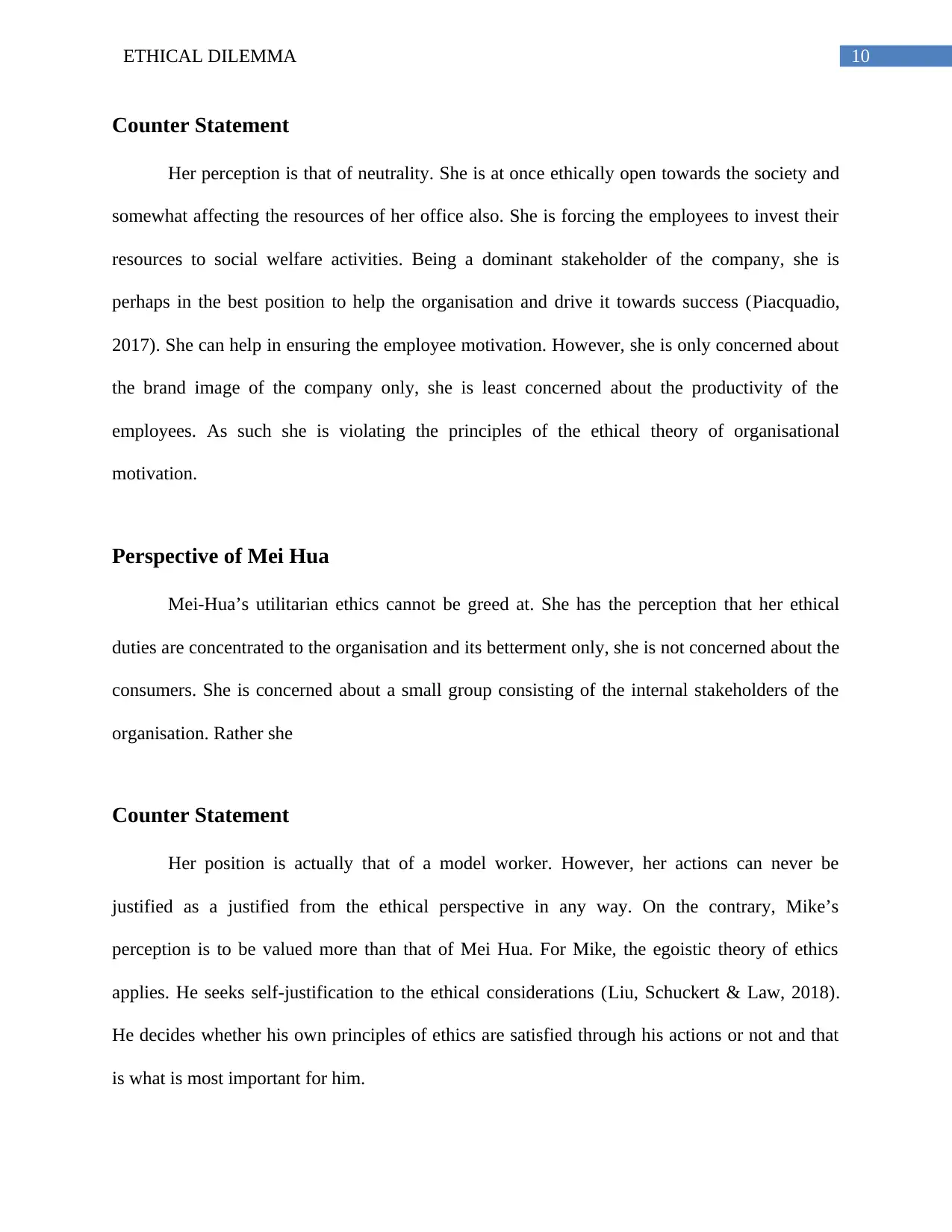
10ETHICAL DILEMMA
Counter Statement
Her perception is that of neutrality. She is at once ethically open towards the society and
somewhat affecting the resources of her office also. She is forcing the employees to invest their
resources to social welfare activities. Being a dominant stakeholder of the company, she is
perhaps in the best position to help the organisation and drive it towards success (Piacquadio,
2017). She can help in ensuring the employee motivation. However, she is only concerned about
the brand image of the company only, she is least concerned about the productivity of the
employees. As such she is violating the principles of the ethical theory of organisational
motivation.
Perspective of Mei Hua
Mei-Hua’s utilitarian ethics cannot be greed at. She has the perception that her ethical
duties are concentrated to the organisation and its betterment only, she is not concerned about the
consumers. She is concerned about a small group consisting of the internal stakeholders of the
organisation. Rather she
Counter Statement
Her position is actually that of a model worker. However, her actions can never be
justified as a justified from the ethical perspective in any way. On the contrary, Mike’s
perception is to be valued more than that of Mei Hua. For Mike, the egoistic theory of ethics
applies. He seeks self-justification to the ethical considerations (Liu, Schuckert & Law, 2018).
He decides whether his own principles of ethics are satisfied through his actions or not and that
is what is most important for him.
Counter Statement
Her perception is that of neutrality. She is at once ethically open towards the society and
somewhat affecting the resources of her office also. She is forcing the employees to invest their
resources to social welfare activities. Being a dominant stakeholder of the company, she is
perhaps in the best position to help the organisation and drive it towards success (Piacquadio,
2017). She can help in ensuring the employee motivation. However, she is only concerned about
the brand image of the company only, she is least concerned about the productivity of the
employees. As such she is violating the principles of the ethical theory of organisational
motivation.
Perspective of Mei Hua
Mei-Hua’s utilitarian ethics cannot be greed at. She has the perception that her ethical
duties are concentrated to the organisation and its betterment only, she is not concerned about the
consumers. She is concerned about a small group consisting of the internal stakeholders of the
organisation. Rather she
Counter Statement
Her position is actually that of a model worker. However, her actions can never be
justified as a justified from the ethical perspective in any way. On the contrary, Mike’s
perception is to be valued more than that of Mei Hua. For Mike, the egoistic theory of ethics
applies. He seeks self-justification to the ethical considerations (Liu, Schuckert & Law, 2018).
He decides whether his own principles of ethics are satisfied through his actions or not and that
is what is most important for him.
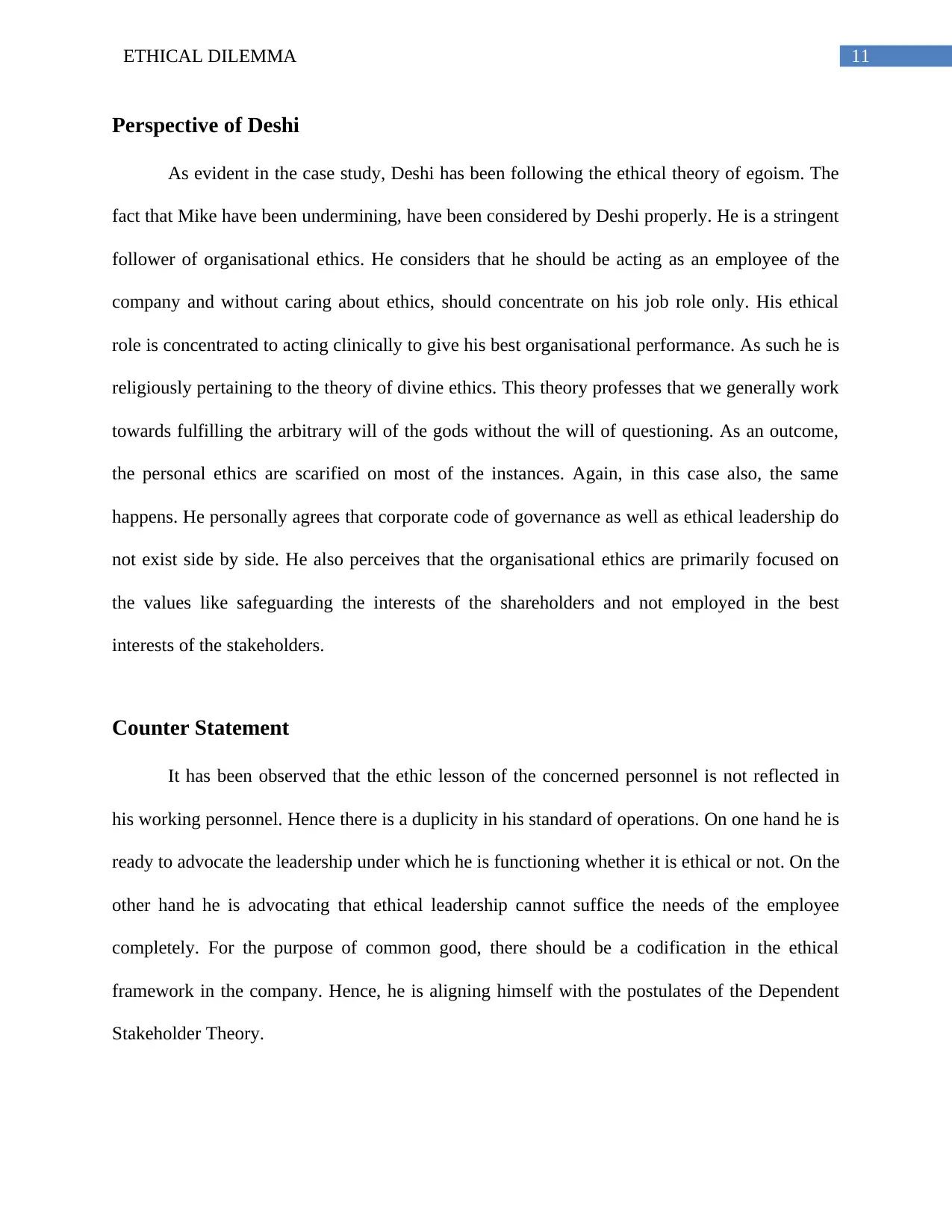
11ETHICAL DILEMMA
Perspective of Deshi
As evident in the case study, Deshi has been following the ethical theory of egoism. The
fact that Mike have been undermining, have been considered by Deshi properly. He is a stringent
follower of organisational ethics. He considers that he should be acting as an employee of the
company and without caring about ethics, should concentrate on his job role only. His ethical
role is concentrated to acting clinically to give his best organisational performance. As such he is
religiously pertaining to the theory of divine ethics. This theory professes that we generally work
towards fulfilling the arbitrary will of the gods without the will of questioning. As an outcome,
the personal ethics are scarified on most of the instances. Again, in this case also, the same
happens. He personally agrees that corporate code of governance as well as ethical leadership do
not exist side by side. He also perceives that the organisational ethics are primarily focused on
the values like safeguarding the interests of the shareholders and not employed in the best
interests of the stakeholders.
Counter Statement
It has been observed that the ethic lesson of the concerned personnel is not reflected in
his working personnel. Hence there is a duplicity in his standard of operations. On one hand he is
ready to advocate the leadership under which he is functioning whether it is ethical or not. On the
other hand he is advocating that ethical leadership cannot suffice the needs of the employee
completely. For the purpose of common good, there should be a codification in the ethical
framework in the company. Hence, he is aligning himself with the postulates of the Dependent
Stakeholder Theory.
Perspective of Deshi
As evident in the case study, Deshi has been following the ethical theory of egoism. The
fact that Mike have been undermining, have been considered by Deshi properly. He is a stringent
follower of organisational ethics. He considers that he should be acting as an employee of the
company and without caring about ethics, should concentrate on his job role only. His ethical
role is concentrated to acting clinically to give his best organisational performance. As such he is
religiously pertaining to the theory of divine ethics. This theory professes that we generally work
towards fulfilling the arbitrary will of the gods without the will of questioning. As an outcome,
the personal ethics are scarified on most of the instances. Again, in this case also, the same
happens. He personally agrees that corporate code of governance as well as ethical leadership do
not exist side by side. He also perceives that the organisational ethics are primarily focused on
the values like safeguarding the interests of the shareholders and not employed in the best
interests of the stakeholders.
Counter Statement
It has been observed that the ethic lesson of the concerned personnel is not reflected in
his working personnel. Hence there is a duplicity in his standard of operations. On one hand he is
ready to advocate the leadership under which he is functioning whether it is ethical or not. On the
other hand he is advocating that ethical leadership cannot suffice the needs of the employee
completely. For the purpose of common good, there should be a codification in the ethical
framework in the company. Hence, he is aligning himself with the postulates of the Dependent
Stakeholder Theory.
⊘ This is a preview!⊘
Do you want full access?
Subscribe today to unlock all pages.

Trusted by 1+ million students worldwide
1 out of 17
Related Documents
Your All-in-One AI-Powered Toolkit for Academic Success.
+13062052269
info@desklib.com
Available 24*7 on WhatsApp / Email
![[object Object]](/_next/static/media/star-bottom.7253800d.svg)
Unlock your academic potential
Copyright © 2020–2026 A2Z Services. All Rights Reserved. Developed and managed by ZUCOL.





